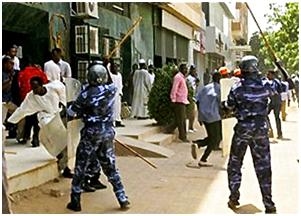 Event Date: 8 March 2011
Event Date: 8 March 2011
Country: South Sudan
For Sudanvotes.com by Richan Ochi

The feminist group, ‘No to Oppressing Women Initiative’, held a press conference on Tuesday 8 March 2011, at the National Umma Party House, on the occasion of the International Women’s Day (IDW).
Activist Ihsan Fagiri spoke about the conditions of women in the country, particularly about the forms of violence which women are exposed to. Fagiri also addressed the issue of Safia Ishac, who accused the security services of torturing and raping her.
The hall was filled with activists and journalists, most of them women. Suddenly the audience decided to go out protesting for stopping violence against women. The meeting place was chosen: Al-Ahlia Square in Omdurman, near the house of late Ismail al-Azhari, who led Sudan to independence as prime minister in 1956.
When I arrived at the scene of the demonstration, the security forces were surrounding the 60 women protestors, who were politicians and opposition leaders, activists, and journalists. All were chanting slogans with bandanas on their foreheads saying “No to oppressing women‚ we are all Safia”.
It did not take long before two officers from the riot police moved towards a group of women commandeering them to disperse. The women refused to obey, and emphasised their decision to remain with the rest of the protestors by sitting on the floor.
Another woman quarrelled with a police officer, who was trying to force her inside a police vehicle by pulling on her clothes and verbally abusing her throughout. A minute later, all the forces present, armed with sticks started arresting the protesting crowd.
34 of us were forced into one of the police cars. One of the detainees took a picture with her cell phone, which made one of the police personnel try to take the phone from her by force, putting his hands in her clothes. The women sitting around started beating him up, until finally they kicked him out of the car.
We arrived at the Central Police Station of Omdurman, where we were put in one of the cells. Five officers, one of whom bore the rank of Colonel, came into the cell and ordered us to stand along the wall. The Colonel spoke sharply ordering one of the police officers: “Write me their names, so I can make their lives bitter at the station.”
We were divided into several groups, each of seven detainees. Our group was to be  transferred to Abu-Saad West Station. There, we were put again in a cell after criminal charges were filed against us. We celebrated the Women\’s Day behind bars.
transferred to Abu-Saad West Station. There, we were put again in a cell after criminal charges were filed against us. We celebrated the Women\’s Day behind bars.
We spent about six hours in custody at Abu-Saad West Station, six hours filled with excitement and sadness. I wandered in the courtyard and my eyes fell on the three women in the next cell. As we chatted, I got to know more about them:
The first lady, in her twenties, wearing a Sudanese dress, sitting on a sack of burlap, smiled at me and said: “I was imprisoned about a month ago, on charges of theft of money from my relative’s husband. I was beaten by the police while I was pregnant, until I started bleeding.”
The second woman, in her forties, was from the South. She suffers from diabetes. She had not been able to access medication for a week. She had to be hospitalised for days. The third woman was a Southerner as well. She and her two infants shared another burlap sack.
I went back to my cell. When my cellmates finished praying, we began chatting about gender and politics, and moved to many other personal topics. While immersed in our conversations, an officer came in and threw two bags containing water and food. We refused to eat in protest for the humiliating way food was handed to us. The answer of the officer came cold and insulting: “Die of hunger‚ or are you on a food strike now?”
Six hours later, a man dressed in white greeted us and introduced himself as the prosecutor. He then ordered us to come out for questioning. Each one of us was interrogated by police officers. All our bandanas and banners were confiscated as evidence to prove the crimes we were charged with before the court. Everyone was released at exactly 11 at night.
I returned home after a rough day, which started in Al-Ahlia Square and ended at Abu-Saad West Station.
Article from Sudanvotes.com